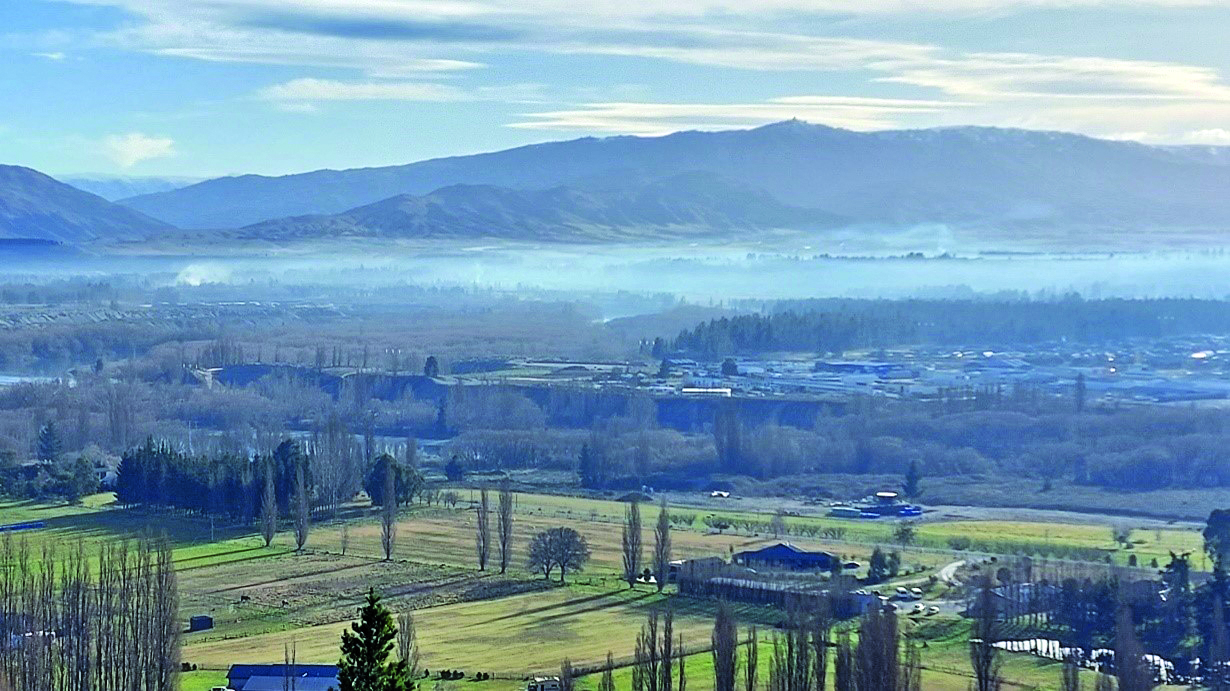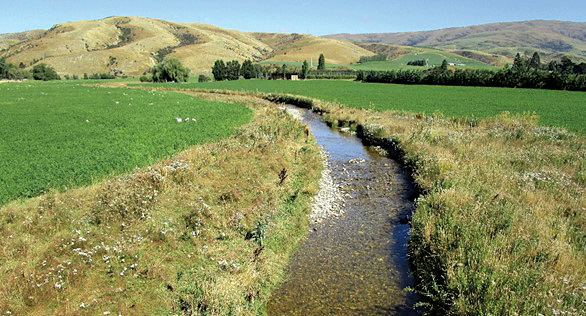-
-
-
-
-
-
-
-
-
The Source - November
-
-
-
-
-
-
-
Te Mātāpuna November 2023

We're heading into summer, a time for enjoying the unique blessings our beautiful region offers us. Otago, with its mighty rivers, serene lakes and picturesque coastlines, is a haven during the holiday period.
In this edition, we share insights into the diverse and exciting work we do day to day.
One of the most significant endeavours underway is the development of our new Land and Water Regional Plan. This will establish policies to guide how we protect and nurture our cherished freshwater environments. We are especially grateful to those who took time to attend drop-in discussions. Your valuable input, ideas and feedback will play a crucial role in shaping this plan, which will be notified for formal consultation mid next year.
Water is a huge part of what we do at ORC. Over summer, you will see us out and about working to ensure the safety of waterways for boaties, monitoring the health of aquatic life, water quality and flow rates and educating people on how to prevent the spread of aquatic pests.
We're working hard to ensure the visions you have shared for our waterways are fulfilled. Like you, we're keen to ensure Otago's summers remain packed full of memory-making days beside thriving rivers, lakes and streams.
Kindest regards,
Gretchen Robertson
Otago Regional Council Chair
Every winter, ORC measures the air quality in different parts of Otago through a continuous air quality monitoring programme.
In 2023, there were 21 breaches of national air quality standards — three in Alexandra, 14 in Arrowtown and four in Mosgiel. In total, four more than in 2022, but still lower than the average 33 exceedances from 2018 to 2021.
The area with the biggest improvement was Arrowtown, where exceedances have declined over the past six years. While there is still room for improvement in other areas, Alexandra, Mosgiel and Central Dunedin also reported fewer breaches over the past two to three years.
ORC measures air quality by measuring particulate matter in the air with a diameter of 10 micrometres or less (PM10) — about the width of a human hair. PM10 includes solid or liquid particles from vehicles, industry, and home heating, such as wood fires, as well as from natural sources.
"Winter exceedances are due to a combination of emissions and the environment they are emitted into. Mostly, they're from wood burners for home heating. We know this because of the extreme seasonal patterns we see in the data," says air quality scientist Sarah Harrison.
ORC has been upgrading the monitoring throughout Otago to maintain National Environmental Standards for Air Quality monitoring work.
- Find out more about air quality and monitoring in Otago:orc.govt.nz/airexceedmr
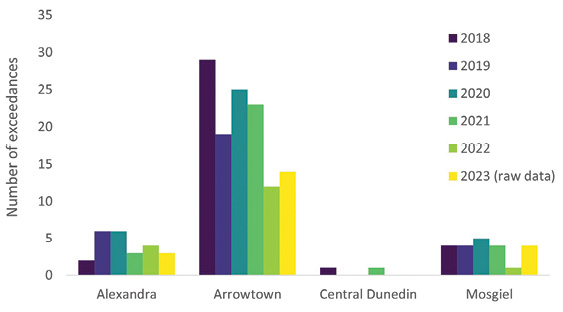 Number of PM10 exceedances 2018–2023
Number of PM10 exceedances 2018–2023
Note: 2023 data is still to be confirmed.
 Remote boats
Remote boats
Remote controlled "Surfbee" flow gauging boats are being used to monitor river levels in Otago's rivers and streams.
Smaller than a paddle board and easy to transport, Surfbee boats are helping to measure river levels and provide important scientific data. These replace traditional time-consuming monitoring techniques and improve efficiency and safety.
The boats allow ORC to test more sites daily and improve the quality of environmental data.
Rain on the plain
We have installed a new rainfall station to help improve flood warning for Middlemarch.
A solar-powered,remote-monitored rain gauge, recently installed around 700m up the Rock and Pillar Range, provides better flood warning for the township, especially during thunderstorm events, and improves environmental rainfall information.
The gauge measures rainfall in real time and the impact of snow melt over time.
Keep up to date with all our water info and rain data at orc.govt.nz/edportal
It’s official: an El Niño summer is on its way.
We’ll be keeping an eye on lake and river levels, and we know farmers will be giving plenty of thought to water needs over summer. ORC can assist farmers with managing water takes, especially if water takes become restricted.
Contact ORC on 0800 474 082 or a catchment advisor at catchments@orc.govt.nz.
Many Otago farms will need freshwater farm plans over the next two years.
Plans are a practical way for farmers and growers to identify and manage the impact of on-farm activities on the freshwater environment. Part of the Government’s Essential Freshwater Package 2020, these plans will be required in parts of Otago from 1 February next year and rolled out to all New Zealand by the end of 2025.
The rollout dates for Otago are:
- North Otago: 1 February 2024
- Lower Clutha: 1 August 2024
- Upper Lakes, Dunstan, Manuherekia and Roxburgh: 1 February 2025
- Taiari/Taieri and Catlins: 1 August 2025
- Dunedin and Coast: 1 December 2025
More than 3,500 Otago farmers will have 18 months following the rollout date in their area to have their freshwater farm plan created and certified. Our staff will be on hand to support them and ensure they understand the process.
- Read more about freshwater farm plans, including a new FAQ section: orc.govt.nz/farmplans
The Whakatipu Wilding Control Group, or WCG, is a community led, non-profit organization focussed on protecting the Whakatipu’s unique biodiversity and outstanding natural landscapes.
Formed in 2009, they have made major progress in stopping the spread of wildings, with over 175,000 ha of wilding pines removed. Winners of the BioHeritage Challenge Community Award at the 2022 Biosecurity Awards, we are proud to support them.

The Whakatipu Wilding Control Group — our biosecurity champions!
There's something very special about Otago's rivers, lakes and harbours, says Harbourmaster Steve Rushbrook.
"It's an environmental jewel, and the wildlife experience is amazing. Sometimes you have to pinch yourself."
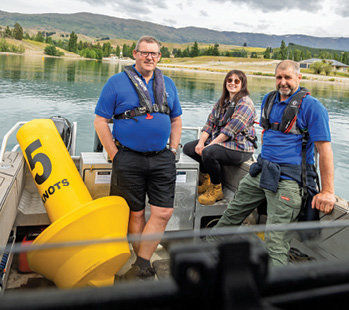
‘Ahoy there!’: Steve, Jen and Pete (pictured at Lake Dunstan)
will patrol lakes and waterways around Otago this summer.
We're coming up to the busiest time of year for the Harbourmaster team of three, who, between them, have around 86 years' experience on waterways around the world.
Their role includes public education, water safety, oil spills, rules and regulations, and working with Port Otago around commercial shipping in Otago Harbour — more than 250 cruise and container ships visited Otago Harbour last year!
But it's not all in the name for the Harbourmaster team, who use two patrol boats to cover lakes, rivers and the sea around the Otago region (excluding the Queenstown Lakes District, which has its own harbourmaster services). Dozens of waterways are monitored, including the Poolburn Dam, Lake Waihola and the Clutha River/Mata-Au, to name a few.
"Education and water safety is a huge part of what we do — we want to make sure boaties get home safely to their families after a day out on the water."
Steve says the most important thing people can do before hitting the water is prepare by doing some homework first. And if in doubt, don't go out. "The same six basic rules apply to anyone on the water, whether you're using a paddle board, kayak or speed boat."
- Check the forecast
- Carry two forms of communication
- Always make a plan
- Wear a lifejacket
- The skipper is always responsible
- Check and research bar crossings
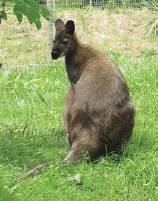 Some spy vs spy tactics are being employed in the battle against an introduced pest which is destroying our environment.
Some spy vs spy tactics are being employed in the battle against an introduced pest which is destroying our environment.
ORC and Environment Canterbury are starting a trial in December that will see 10 captured wallaby fitted with GPS collars before being released in locations within the feral range of Bennett's wallaby. The collared Bennett's wallabies will infiltrate wallaby groups and 'rat' out the locations of this difficult-to-track pest, allowing both councils to keep tabs on populations and target control efforts.
Wallabies wreck pastures and destroy young trees — we need to act now to stop them in their tracks here in Otago. If you see a wallaby, report it at reportwallabies.nz. If you see a wallaby wearing a collar, it's probably a spy.
Fast action and new equipment helped prevent impacts to the environment or wildlife after an oil spill from a sunken boat at Carey's Bay, Dunedin, recently.
Containment booms and two mechanical skimmers were used to remove more than 3300 litres of oily water from around the sunken 60-tonne vessel.
Around five ORC staff were involved in the clean-up, using skimmers provided by Maritime New Zealand's Pollution Response unit.
ORC Deputy Harbourmaster Pete Dryden says ORC had practised with the skimmers in the past, but this was the first time they had been used for an oil spill.
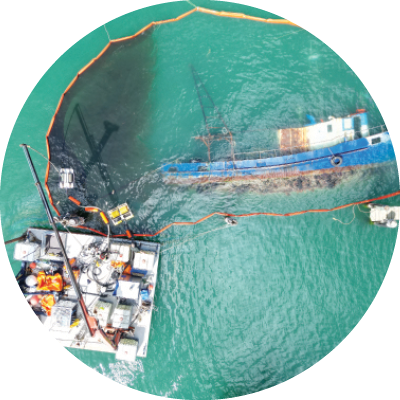
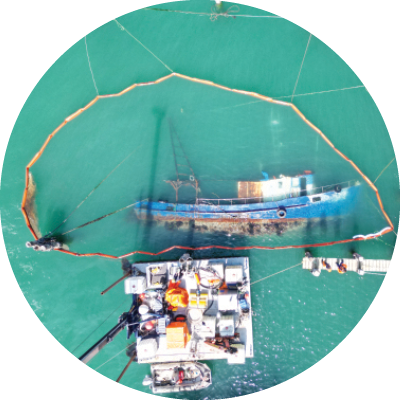

A bird survey across Otago wetlands has discovered two rare and elusive birds — with the public being asked to report any sightings.
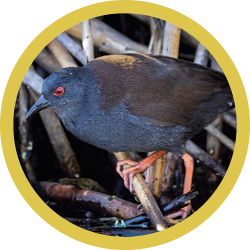
Rarely seen . . .
a pūweto / spotless crake.
Photo: Oscar Thomas
Both the Otago matuku-hūrepo (Australasian bittern) and pūweto (spotless crake) were identified in the first year of a five-year study by ORC, Birds NZ, Department of Conservation, University of Otago, and Forest and Bird Society.
ORC's Terrestrial Ecologist Dr Scott Jarvie says researchers want to establish the distribution of each species in Otago, both being at heightened risks of extinction on the NZ threat classification system.
"We're really keen to hear of any sightings of these elusive birds," Dr Jarvie says.
The matuku-hūrepo were recorded in the Catlins, including Tahakopa and Fleming valleys and around Catlins Lake; Lake Tuakitoto; Te Nohoaka o Tukiauau / Sinclair Wetlands; and near Queenstown. The survey also discovered pūweto in a new Otago location in the Fleming wetland, near Papatowai.
Dr Jarvie says it's now rare to see matukuhūrepo or pūweto as their numbers had greatly declined following the destruction of 90% of their wetland habitat.
The matuku-hūrepo is a large wetland bird which is hardly ever seen — a shy and secretive species which blends into its surroundings and lives in a difficult-to-access habitat, Dr Jarvie says.
It was a school of children, rather than a school of fish, caught in Queenstown's Horn Creek recently.
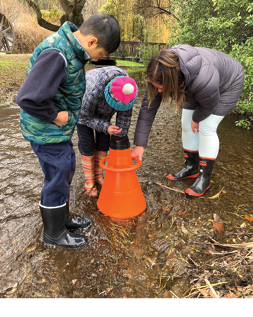
A class of Year 5 Queenstown Primary School pupils have been investigating Horn Creek with their Enviroschools facilitator, Nicky Gray.
They found the creek was not as healthy as it could be and had rubbish in and around it, including bottles, parking tickets and even a car jack.
Investigating further, they learnt that planting along the banks of the creek could help its health and wrote to the Queenstown Lakes District Council (QLDC), asking for help.
Meeting with the Parks team at QLDC, they've worked out where the pupils can start planting. It's amazing what motivated, passionate young people can achieve.
- We can save the creek and we can plant native plants. The roots clean the water in the creek and the plants give the creek shade. It’s not too late to save the creek! - Mady
- We MUST plant lots of riparian plants at the creek edge to filter the water … if the state of the creek continues like this, toxic algae and E. coli will make its way into the creek and poison humans and macroinvertebrates in the creek. - Lincoln
Wherever you float your boat, paddle board, kayak or lilo in Otago this summer, remember to check, clean and dry your gear to stop the spread of aquatic pests like didymo, lake snow and lagarosiphon.
Also, be on the lookout for the freshwater gold clam, a fastspreading pest which may be trying to hitchhike here from the North Island. Ban the clam!



